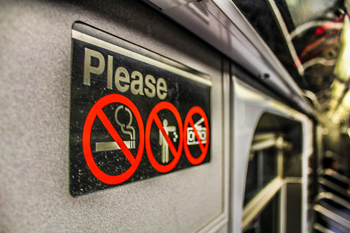Pakistan's Struggle to Regulate Alternative Tobacco Products

Pakistan has been unable to come up with regulation regarding alternative tobacco products – electronic cigarettes and nicotine pouches. There have been calls to ban these alternative tobacco products. The Punjab government did ban the outlets selling electronic cigarettes, but the Lahore High Court overturned the ban.
It called for immediate closure of all vaping centers across the province. A bill has been submitted in the Senate, the upper house of parliament, which calls for extending prohibitions in the 2002 tobacco ordinance to Electronic Nicotine Delivery Systems. It also calls for the use of ENDS in public places and vehicles, restricting and regulating their sale to minors, banning advertisements inconsistent with prescribed guidelines, and prohibiting storage, sale, or distribution near educational institutions.
Since 2015, Pakistan has witnessed a steady increase in the sale and use of electronic cigarettes and a significant increase in the sale and use of nicotine pouches. Unlike rest of the countries globally, Pakistan has not taken any concrete steps to regulate the use of alternative tobacco products.
Pakistan enforces demand-side measures—such as prohibiting sales to minors, banning single-stick sales, and mandating health warnings—there remains a significant regulatory gap on the supply side. This vacuum is especially evident with emerging products like flavoured vapes, which are designed to attract younger users and have witnessed rapid market expansion in the absence of targeted legislation.
As of mid-2025, 46 countries have implemented comprehensive bans on the sale and distribution of electronic cigarettes (e-cigarettes or vapes). However, these bans vary in scope—some prohibit only sales, while others also restrict possession and use. On the other hand, 87 countries all sales but impose restrictions. These include age restrictions, flavor bans, advertising and sponsorship prohibitions, public use limitations, and packaging and labeling requirements. Seventy four countries have no specific regulations on e-cigarettes, often due to legislative gaps or enforcement challenges.
Notably, some bans are partial or region-specific. Malaysia bans nicotine-containing vapes in most states but has a thriving market for non-nicotine products, while Australia allows nicotine vapes only via prescription. UK plans to ban disposable vapes by 2025, not all e-cigarettes.
The mushrooming of vape shops in the metropolitans such as Karachi, Lahore, Islamabad, and Rawalpindi is becoming a source of concern, and hence the calls for banning them. Though there are no exact estimates are available on the number of vape shops, estimates show more than 800 outlets across Pakistan.
According to the Pakistan Bureau of Statistics, Pakistan legally imported 750,590 e-cigarettes and vaporizers between July 2023 and June 2024, with primary shipments originating from China, Hong Kong, Malaysia, the United Kingdom, and Russia. These figures reflect only documented imports—unofficial channels, particularly from China, are believed to account for a substantial volume of additional devices brought into the country through smuggling.
First things first, Pakistan needs to establish a clear legal framework for the sale and use of alternative tobacco products. This legal framework should be sensibly regulating these products, mainly relying on the continuum of risks associated with these products. Currently, the alternative products are used in a policy vacuum. There is a need for defining these products and their categories. Differentiate between e-cigarettes, nicotine pouches, heated tobacco, and oral tobacco. This should be followed by requiring importers, manufacturers, and retailers to register and comply with safety standards. Age restrictions should be finalized and implemented strictly. The minimum age for the purchase and use of these products should be 18+.
The next important step is quality control. There should be mandatory testing for nicotine concentration, contaminants, and labeling accuracy. Packaging regulations such as health warnings, usage instructions, and child-resistant features should be introduced and implemented. The most critical aspect is monitoring the imports and sale of these products. The availability of customs data and retail audits will help monitor legal and illicit flows.
Apart from these measures, there is an urgent need for educating the public about these products to clarify the risks and relative harm of vaping vs. smoking. To ensure that these products are used sensibly, healthcare providers should be trained. There is a need to equip doctors and counselors to guide smokers toward safer alternatives. Most importantly, Pakistan needs to study the experiences of the UK, Sweden, and New Zealand. These countries have successfully integrated harm reduction into tobacco control.
اردو مضامین
ترک سگریٹ نوشی کی مخالفت کیوں؟، ارشد رضوی

پاکستان سن 2002 میں ورلڈ ہیلتھ آرگنائزیشن ( ڈبلیو ایچ او ) کے فریم ورک کنوینشن آن ٹوبیکو کنٹرول (FCTC) کا رکن بنا تھا، تب سے اب ( 2023 ) تک اکیس سال گزر چکے ہیں پاکستان (اور دنیا بھر) میں سگریٹ نوشوں میں اضافہ ہی ہوا ہے۔ ایک رائے کے مطابق دو کروڑ نوے لاکھ ( 29,000,000 ) جبکہ بعض رپورٹس تین کروڑ دس لاکھ ( 31,000,000 ) سگریٹ نوشوں کی موجودگی کی بات کرتی ہیں، اگر پچیس کروڑ کی آبادی مان لی جائے تو پاکستان میں 12 فیصد آبادی تمباکو استعمال کرتی ہے۔
ترک سگریٹ نوشی میں مدد گار متبادل، ارشد رضوی

سگریٹ یا تمباکو نوشی کے نقصان دہ اثرات کے بارے میں ستر سال قبل ہونے والی ایک سٹڈ ی میں بتایا گیا تھاتب سے اب تک دنیا میں کروڑوں لوگ تمباکو سے متعلق بیماریوں کے باعث موت کی تاریک وادی میں جا چکے ہیں
صحت، تمباکو اور ریونیو، ارشد رضوی

تمباکو نوشی کا انسان سے رشتہ بہت پرانا ہے۔ تمباکو اور اس سے متعلق مصنوعات کی طویل تاریخ ہے جو 6000سال قبل مسیح میں ملتی ہے۔مقامی امریکیوں کے بارے میں کہا جاتا ہے کہ انہوں نے پہلے تمباکو کی کاشت شروع کی اور یہ 6000سال قبل مسیح میں ہی ہوا۔
انسانی صحت اور عالمی ادارہ صحت، ارشد رضوی

اگر عالمی ادارہ صحت کچھ مختلف طرزِ عمل اختیار نہیں کرتا اور تمباکو پالیسی میں جدّت کو قبول نہیں کرتاتو ادارہ دل، کینسر اور پھیپھڑوں کے امراض میں کمی کے اہداف کے حصول میں بہت پیچھے رہ جائے گا۔
جو فرد سگریٹ نوشی ترک کرنا چاہتا ہے اس کی نیکوٹین کی طلب اور نفسیات کو سامنے رکھتے ہوئے کونسلنگ کی ضرورت ہے، ڈاکٹر احسن لطیف

اگر ہم چاہتے ہیں کہ سگریٹ نوشی ختم ہو جائے تو سگریٹ پینے والوں کواس بارے میں تمام بحث میں سب سے آگے ہونا چاہئے تاکہ وہ اپنی ضرورتوں کا خیال رکھ سکیں۔
ما قبل کورونا اور ما بعد، ارشد رضوی

کورونا کے مابعد اثرات میں ایک خوفناک ترین اثر بڑے پیمانے پر دنیا کی آبادی کے ایک بڑے حصے کا خطِ غربت سے نیچے گِرنے کا اندیشہ ہے جس کے نتیجے میں بے روزگاری اور غربت میں غیر معمولی اضافہ ہو گا۔
OUR PROJECTS
Pakistan is a country with heavy use of tobacco. With more than 24 million...
Read MoreRESEARCH ARTICLES
The Birth of Harm Reduction Informs the World's Need for Safer Nicotine...
Read MoreWHAT WE DO?
Alternative Research Initiative (ARI) works to provide researched-based solutions...
Read More
